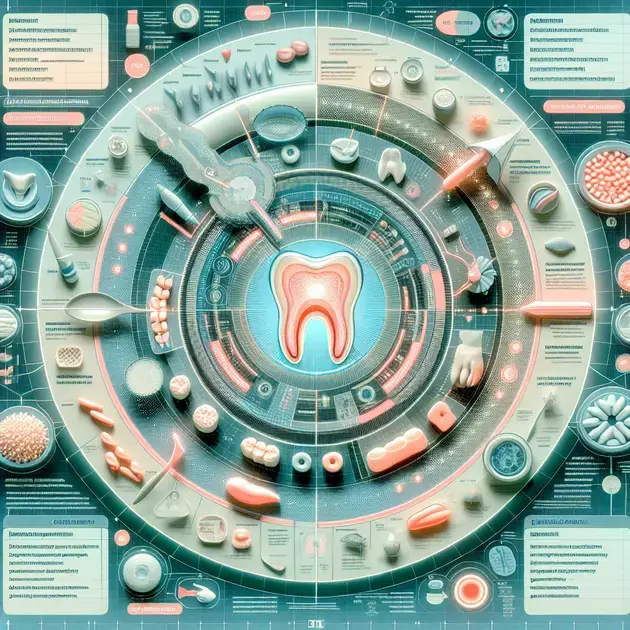When it comes to combating periodontitis, finding the most effective medication is crucial for successful treatment. In this comprehensive guide, we will explore the various options available to help manage and improve the condition.
Periodontitis is a common inflammatory disease that affects the gums and surrounding structures of the teeth. With the right medication and proper care, it is possible to control the progression of the disease and maintain oral health. Let’s dive into the world of effective medication for periodontitis and learn how it can make a difference in your dental health.

Effective Medication Choices for Periodontitis
When it comes to treating periodontitis, choosing the right medication is crucial for managing the condition effectively. There are several types of medications that can be used to help combat the bacteria that cause gum disease and prevent further damage to the gums and teeth.
One effective medication choice for periodontitis is chlorhexidine mouthwash. This antibacterial mouthwash helps to reduce plaque and gingivitis, two key factors in the development of periodontitis. You can easily find chlorhexidine mouthwash at your local pharmacy or order it online from reputable websites such as Amazon or Walgreens.
Another medication option is antibiotic therapy, which can be prescribed by your dentist or periodontist. Antibiotics such as doxycycline or minocycline are often used to target and eliminate the bacteria causing gum disease. Your healthcare provider will provide you with a prescription and instructions on how to take the medication.
For more severe cases of periodontitis, your dentist may recommend a combination of medication and surgical treatment. This may involve the use of antibiotics in conjunction with procedures such as scaling and root planing to thoroughly clean the teeth and gums and remove bacteria.
It’s important to follow your dentist’s recommendations and take your medication as prescribed to achieve the best results in managing periodontitis effectively.
Understanding Periodontitis Treatment Options
Periodontitis is a serious condition that requires prompt and proper treatment to prevent further damage to the gums and teeth. Understanding the various treatment options available can help you make informed decisions about managing your periodontitis.
One common treatment option for periodontitis is non-surgical therapy, which includes procedures such as scaling and root planing. These treatments help to remove plaque and tartar buildup from the teeth and roots, reducing inflammation and promoting gum healing. You can learn more about these procedures on websites such as WebMD or the American Dental Association.
In more advanced cases of periodontitis, surgical intervention may be necessary. Procedures such as flap surgery or gum grafts can help to repair damaged gum tissue and restore the health of your gums. Your periodontist will discuss these options with you and provide information on what to expect during and after the procedure.
Maintaining good oral hygiene practices, such as regular brushing and flossing, is essential in conjunction with any treatment plan for periodontitis. Websites like Colgate or Oral-B offer helpful tips and resources on proper oral care to support your treatment regimen.
By understanding the treatment options available and working closely with your dental healthcare provider, you can effectively manage and improve the health of your gums despite having periodontitis.
Tips for Managing Periodontitis with Medication
Managing periodontitis with medication requires a combination of consistency, proper technique, and regular follow-up care. By following these tips, you can ensure that your medication is effectively helping to control your gum disease.
First and foremost, make sure to take your medication as prescribed by your healthcare provider. Whether it’s a mouthwash, antibiotic, or other medication, following the recommended dosage and frequency is essential for the treatment to be successful. You can set reminders on your smartphone using apps like Medisafe or MyTherapy to help you stay on track.
In addition to taking your medication, it’s important to maintain a good oral hygiene routine. Brushing your teeth twice a day, flossing regularly, and using an antiseptic mouthwash can help to keep bacteria in check and prevent gum disease from worsening. The American Academy of Periodontology website offers valuable resources on proper oral care practices.
Keep track of any side effects or changes in your symptoms while on medication and report them to your dentist or periodontist. They can adjust your treatment plan as needed to ensure you are receiving the most effective care for your periodontitis.
Lastly, attend regular dental check-ups and cleanings to monitor the progress of your treatment and address any concerns or questions you may have. Your dental healthcare provider can provide additional tips and guidance on managing periodontitis with medication to help you achieve optimal oral health.

Understanding Periodontitis Treatment Options
Periodontitis is a serious gum infection that can lead to tooth loss if not properly treated. When it comes to treating periodontitis, there are several options available depending on the severity of the condition. One common treatment option is scaling and root planing, which involves deep cleaning of the gums to remove plaque and tartar buildup. This procedure helps to reduce inflammation and promote gum healing.
Another treatment option for periodontitis is antibiotic therapy. This involves taking antibiotics to eliminate the bacteria causing the infection. Antibiotics can be taken orally or applied directly to the infected areas. In more severe cases, surgery may be necessary to repair damaged gum tissue and bone.
It is important to work closely with your dentist or periodontist to determine the best treatment option for your individual case. They will evaluate the severity of your periodontitis and recommend the most effective treatment plan to restore your gum health.
By understanding the different treatment options available for periodontitis, you can make informed decisions about your dental care and take the necessary steps to improve your oral health.
Overall, treatment for periodontitis requires a comprehensive approach that may include a combination of therapies to effectively manage the infection and prevent further damage to your gums and teeth.
Tips for Managing Periodontitis with Medication
Medication can play a crucial role in managing periodontitis and preventing its progression. One common medication prescribed for periodontitis is antibiotics, which work to eliminate the bacteria causing the infection. These antibiotics can be taken orally or applied directly to the affected areas.
Another type of medication that may be used for managing periodontitis is antimicrobial mouth rinses. These rinses can help reduce plaque and bacteria in the mouth, promoting gum health and preventing further infection.
It is important to follow your dentist’s instructions carefully when taking medication for periodontitis. Be sure to take the prescribed dosage at the recommended times to ensure the medication is effective in treating the infection.
In addition to medication, maintaining good oral hygiene practices such as regular brushing, flossing, and dental check-ups is essential for managing periodontitis. These habits can help prevent plaque buildup and reduce the risk of infection.
By combining medication with proper oral hygiene, you can effectively manage periodontitis and improve your overall gum health. Working closely with your dentist or periodontist will ensure you receive the best treatment plan for your individual needs.
Benefits of a Holistic Approach to Periodontitis Treatment
A holistic approach to periodontitis treatment involves addressing the underlying causes of the infection and promoting overall health and well-being. This approach focuses on treating the whole person, not just the symptoms of the disease.
One benefit of a holistic approach to periodontitis treatment is that it takes into account the connection between oral health and overall health. By addressing lifestyle factors such as diet, stress, and sleep, you can improve your immune system and reduce inflammation in the body, which can help prevent gum disease.
Furthermore, holistic treatments may include natural remedies such as herbal supplements, acupuncture, and meditation to promote healing and reduce the need for medications with potential side effects. These alternative therapies can complement traditional periodontal treatments and provide a more comprehensive approach to managing the infection.
Overall, a holistic approach to periodontitis treatment can lead to improved oral health, reduced inflammation, and enhanced overall well-being. By considering the whole person in treatment, you can achieve long-lasting results and maintain optimal gum health for years to come.
Working with a dentist or healthcare provider who understands and supports a holistic approach to periodontitis treatment can help you create a personalized treatment plan that addresses your specific needs and promotes lasting oral health.
Conclusion
In conclusion, treating periodontitis requires a multifaceted approach based on the severity of the condition. Options such as scaling and root planing effectively reduce inflammation and promote gum healing, while antibiotic therapy is crucial for eliminating the bacteria causing the infection. In severe cases, surgical intervention may be necessary to repair damaged tissues. Collaborating closely with dental professionals is essential to tailor the treatment plan to individual needs and restore gum health.
Furthermore, managing periodontitis with medication, including antibiotics and antimicrobial mouth rinses, plays a key role in preventing disease progression. Adhering to prescribed dosages and maintaining good oral hygiene practices like brushing and flossing are vital steps in managing the condition effectively. By combining medication with proper hygiene, patients can enhance overall gum health and work towards preventing further infection.
Lastly, embracing a holistic approach to periodontitis treatment can yield benefits by addressing not just symptoms but also underlying causes. This approach considers the intricate link between oral health and overall well-being, emphasizing lifestyle factors like diet and stress management. Incorporating natural remedies alongside traditional treatments can lead to improved oral health, reduced inflammation, and long-lasting results. Partnering with healthcare providers who support a holistic approach ensures a personalized treatment plan that promotes lasting oral health and well-being.



